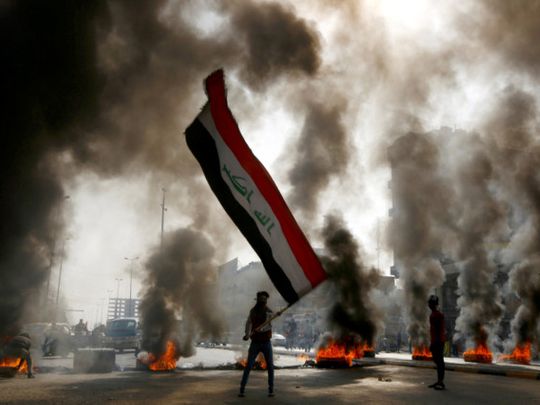
Tens of thousands of people in Iraq and Lebanon have been protesting against their governments for weeks now.
In Iraq, the demonstrators have faced brutal repression, with more than 400 protesters killed so far, whereas, in Lebanon, the protests have thankfully been relatively peaceful with one recorded death to date.
But, despite the drastic differences between their handling of the protests, political leaders in the two countries have been dragging their feet on enacting real reforms.
Apart from the resignation of Lebanese Prime Minister Sa’ad Hariri last month, there has been no agreement by Lebanon’s ruling elite on the way forward.
This week, however, there seemed to be growing consensus among Lebanon’s political elite to nominate consensus candidate Samir Al Khatib as premier.
In Iraq, Tehran has openly intervened, sending in Iran’s Revolutionary Guards chief, Qassem Soleimani, to personally intervene in a bid to make sure the government of Adel Abdul Mahdi does not fall
Having never held any public office, he could be an acceptable choice to Lebanese who want to do away with the country’s ruling elite.
Lebanese citizens want the removal of all corrupt politicians, but it seems that controversial foreign minister Gebran Bassil is refusing to budge.
This point will be the trickiest to navigate going forward.
In Iraq, Tehran has openly intervened, sending in Iran’s Revolutionary Guards chief, Qassem Soleimani, to personally intervene in a bid to make sure the government of Adel Abdul Mahdi does not fall.
However, after much bloodshed and heartache, Abdul Mahdi finally offered to resign this week.
Now begins the complicated and delicate process of agreeing on his replacement.
What is similar between both countries is that Iran wants to make sure whoever replaces the outgoing premiers will not compromise its influence there.
This is not the first time Iran has intervened to bolster a government that the people sought to topple.
It is because of Iran, and also Russia, that the government of Bashar Al Assad in Syria is still intact, despite a gruelling eight-year civil war that killed nearly half a million people and practically destroyed the country.
It is vital that the leaders of both countries put their citizens’ needs before those of foreign interests.
Iran should act as a neighbourly state and not hold the Lebanese and Iraqi people hostage to its political agenda.
It is also vital that the next leaders put citizens’ needs before that of the ruling elite.
Both countries require technocratic leaders that work to resolve deep-seated problems in the country.
The priority for both countries should be on their failing economies and finding ways to root out corruption and replenish state coffers, so as to invest in their people’s development.








